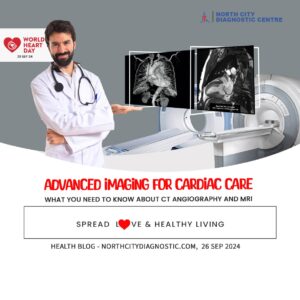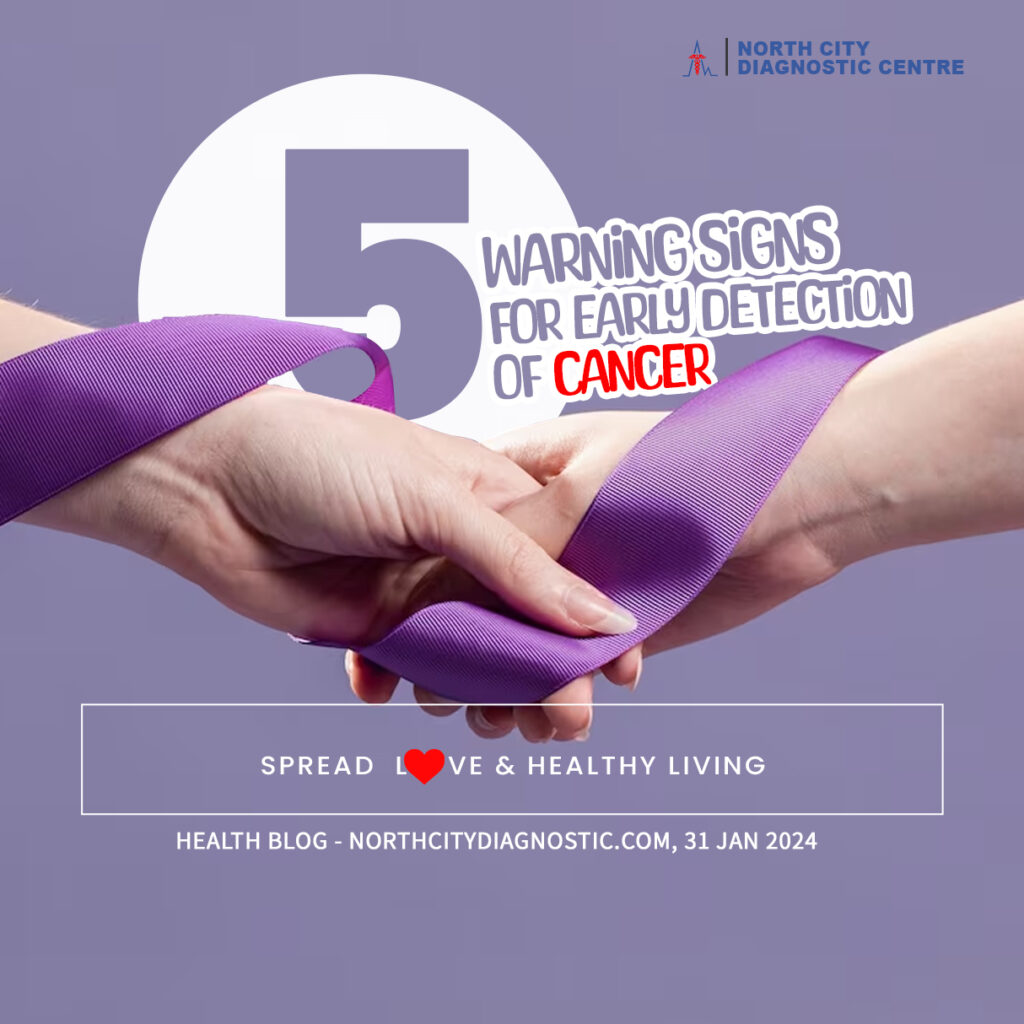
Menu
In the hustle and bustle of life, it’s easy to dismiss subtle signs our bodies might be sending us. However, when it comes to potential cancer symptoms, ignoring them can have serious consequences. In fact, early detection of cancer can make all the difference in the battle against this disease.
As such, it is important to pay close attention to five early warning signs that demand your attention. We’ve all experienced tiredness, but when fatigue becomes a constant companion, it might be signalling an underlying issue. Unexplained weight loss, especially when accompanied by loss of appetite or fatigue, can be a sign of underlying medical issues, including cancer. Any unusual lumps or swelling in the body, including the breasts, testicles, or lymph nodes, should be investigated by a medical professional. Persistent pain could be a sign of an underlying health condition, and should never be ignored. While cancer is a possibility, there are many other potential causes, so it’s best to seek medical attention to rule out any serious issues. Beware of changes in bowel or bladder habits. They are frequently overlooked but can be indicative of gastrointestinal cancers.
It is important to remember that early detection of cancer can be a game-changer in the fight against this disease. Regular check-ups with your doctor, as well as being aware of these potential warning signs, can help to ensure that any issues are caught early and treated effectively. So, if you notice any of these symptoms, don’t hesitate to seek medical attention. Your health is too important to ignore.

“Life is not measured by the number of breaths we take, but by the moments that take our breath away.”
– Maya Angelou
Fatigue is common to all. Most of us get over it after a good night’s sleep. The type of fatigue we are discussing here is not like the one you experience after a long day at work or play. When extreme fatigue does not improve even after rest, it could be an early sign of cancer.
Did you know, 40% of patients report experiencing it at the time of diagnosis?
Fatigue is a common and debilitating symptom experienced by cancer patients. Cancer-related fatigue (CRF) is characterized by feelings of tiredness, weakness, and lack of energy. It is different from normal drowsiness experienced by healthy individuals in that it is not relieved by rest or sleep. CRF occurs as a result of the cancer itself and as a side effect of cancer treatment. However, the exact cause is still largely unknown.
CRF may manifest as an early symptom of malignant disease, and as told before around 40% of patients report experiencing it at the time of diagnosis.
What happens is that cancer utilizes the nutrients present in your body to grow and spread, which means that the same nutrients that were once replenishing your body are no longer available. This phenomenon is commonly referred to as “nutrient theft” and can lead to extreme tiredness or fatigue.
However, it is important to note that fatigue can have various other underlying causes, not all of which are related to cancer. If your symptoms are severe enough to affect your quality of life, it is recommended that you go for a health check-up.
Early detection of cancer is the key for better treatment, increased quality of life, longevity and can even help a patient make complete recovery.
Almost everyone experiences changes in weight throughout their life – be it gaining or losing. Factors like diet, exercise, pregnancy, hormonal shifts, and aging can influence weight, and it’s usually considered a normal part of life.
However, shedding pounds without a clear reason is not typical and might signal an underlying health issue, possibly something as serious as cancer. In fact, weight loss can be both a symptom of cancer and a consequence of the disease or its treatment.
All types of cancer share a common trait – the presence of abnormal cells. These cancerous cells multiply and outgrow healthy cells, tapping into the body’s energy reserves and causing cancer patients to burn more calories even at rest.
Between 31% and 87% of cancer patients report experiencing unexplained, unintentional weight loss – a sign to look for early detection of cancer. This weight change, usually a loss of 10 pounds or more, is commonly observed with cancers in specific areas like the pancreas, stomach, esophagus, and lungs.
The presence of an unusual or unexpected lump or swelling is a major cause for concern. These lumps and swellings may be benign or malignant indicating various types of cancer, such as breast cancer or lymphoma. Taking prompt action is crucial for successful outcomes. It is crucial to consult healthcare professionals as soon as a lump or swelling is noticed to ensure timely assessments and interventions. Advanced imaging, nuclear medicine, FNAC or biopsy depending on the location, other symptoms and nature of the lump are done to confirm or rule out the possibility of malignancy. However, doing it without much ado is critical.
Asmita Talukdar (name changed), a 42-year-old resident of Kolkata, was managing both her professional and personal responsibilities with aplomb. During a routine self-examination, she discovered a small but unfamiliar lump in her breast. Worried but unsure of its significance, she opted for a preventive health check-up doctor at our diagnostic center after consulting her doctor.
The diagnostic tests, which included advanced digital mammography, provided a comprehensive understanding of the lump. The lump was malignant, fortunately it was detected early. Asmita’s proactive approach and timely consultation enabled this early detection and successful treatment. Her story highlights the importance of individual vigilance and the support of state-of-the-art diagnostics.
Pain can be good. It lets us know something isn’t right. If you break a bone, it hurts. Sometimes your back hurts after lifting heavy things or you feel pain even when you’re not doing anything.
Everything in life has good and bad sides. When you’re in pain, it can be hard to work or do daily activities. It may be tough to sleep or eat.
If you feel pain that doesn’t go off easily you definitely need to go for a check-up.
Cancer can cause pain too.
Cancer can induce pain through various mechanisms, such as:
How much pain you feel depends on the kind of cancer, how far it has spread, any other health issues you have, and your pain threshold (how much pain is painful for you). Studies shows people with advanced cancer are more likely to have pain.
Changes in your bowel and bladder habits can provide clues about what’s happening inside your digestive and urinary system. Changes include differences in your poop or urine color, smell and frequency. The presence of blood or other indicators during diagnostic test reveal what’s wrong.
Most changes aren’t cause for concern, but others may be signs of a condition you need to diagnose and treat. Changes in bladder and bowel habits could be indicative of colorectal, bladder, prostate, cervical cancers.
What really helps in the treatment and longevity and even getting a recovery is early detection of cancer. Whenever some symptoms show up no matter how small or ignorable it may be to you. We suggest get visit a doctor and get tested. It is cheaper and better to be sure than be sorry.
At North City Diagnostic Center we offer personalized testing schedule that aligns with your medical history and risk factors. Consistent monitoring can be invaluable for early detection and effective management of arthritis. It’s not just about how often you test but making sure that the tests are aligned with your overall health profile for maximum benefit.
#CancerAwareness #EarlyDetection #HealthAndWellness #KolkataDiagnosticCentre #Pathology #NuclearMedicine #DiagnosticImaging #Radiology #CancerPrevention #NDC #HealthFirst #NDC #DiagnosticServices #Wellbeing #Cancer #Carcinoma #Carcinogen #EarlyDetectionofCancer #YouCan #NorthCityDiagnosticCentre #RoadmapToGoodHealth #HealthandWellness
35-A ,Canal West Road
Near Gouri Bari Bus Stop
Kolkata – 700004.
Local: +91 33 6605 0888